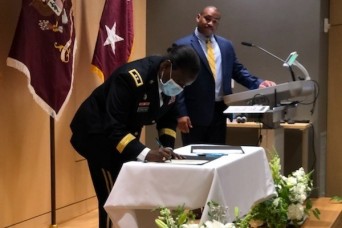
CHAPEL HILL, North Carolina (Nov. 11, 2020) — Army Medicine leaders traveled to the University of North Carolina Chapel Hill, Nov. 11, to join the UNC Health executive leadership to formally announce and celebrate the newest AMEDD strategic partnership.This military-civilian partnership with UNC Health will allow military medical personnel to train at the UNC Medical Center, thereby ensuring the readiness of the Nation’s military medical force to save lives on the battlefield and at home.The 803-bed UNC Medical Center serves more than 37,000 people annually. A military-civilian partnership with the medical center is ideal, as North Carolina is also the home of the largest military installation in the world at Fort Bragg in Fayetteville.Providers from the U.S. Army’s Forward Resuscitative Surgical Teams and other medical personnel from U.S. Army Forces Command and other tenant commands at Fort Bragg, will work with civilian health care personnel in the emergency department, the operating rooms, and intensive care units.Hosting the partnership ceremony on Veterans Day, the day when America honors all those who have served, was also regarded as “symbolic” and representative of the Army Medicine mission to remain “Ready, Reformed, Reorganized, Responsive, and Relevant.””It’s a special opportunity. We have a lot of reasons not to make time to recognize important moments like this, and I’m so grateful that we didn’t do that today,” said Maj. Gen. Telita Crosland, Deputy Army Surgeon General, Deputy Commanding General of Operations for the U.S. Army Medical Command and Chief of the Army Medical Corps. “We found the time; we made the time; we made the space on a historic day for the military to commemorate a key partnership that’s going to help us as Soldiers, do better.”Crosland represented Army Medicine on behalf of the Army Surgeon General, Lt. Gen. R. Scott Dingle. She arrived at the medical center with Command Sgt. Maj. Diamond Hough, U.S. Army Medical Command and were accompanied by John Ramiccio, Deputy, G-3/5/7 (Operations), OTSG; and Cynthia Barrigan, Program Manager, AMEDD Medical Skills Sustainment Program/Director, Military-Civilian Partnerships, G-37, Readiness & Training Division, OTSG.The event required attendees to wear face coverings and maintain appropriate social distancing.”These kind of partnerships allow us to maintain a clinical competency, and the training keeps our AMEDD Soldiers at their highest level of proficiency ready to deploy and win on future battlefields and today’s battlefield,” Crosland said.UNC Health executives, including Gary Park, Chief Operations Officer; Steve Burriss, President; Dr. Cathy Madigan, Chief Nursing Officer; and Dr. Daryl Johnson II, Adult Trauma Medical Director, UNC School of Medicine, escorted Army Medicine leaders on a tour of the facility’s emergency room, operating room and burn center/intensive care unit.The high point of the visit was the signing of medical training agreements, which included Crosland and Dr. Wesley Burks, Dean of the UNC School of Medicine, Vice Chancellor for Medical Affairs and Chief Executive Officer, UNC Health.The UNC Medical Center is the 7th Level I trauma center to partner with the Army Medical Skills Sustainment Program (AMSSP). The program develops partnerships with civilian trauma centers and hospitals to build medical sustainment capabilities in Army medical personnel. These partnerships offer specialized medical training to active duty, Army National Guard, Army Reserve personnel and a cross-service mix from the Army, Air Force, and Coast Guard as part of Operation SMART (Strategic Medical Asset Readiness Training).The SMART program, which was established in August 2018 and managed by OTSG, is a two-week program that provides medical military occupational specialties, such as combat medics, the opportunity to get “hands on” training alongside their civilian counterparts in premier trauma centers and hospitals throughout the United States. Currently, there are six SMART participants going through training at the UNC Medical Center.”I think, as we move forward and we continue to adapt to our environment, these partnerships are going to be critical to our success. They give us the opportunity to see types of trauma that we normally might not see in our own [training] facilities, and the abilities it gives our Soldiers increases their skillset. And, ultimately that’s what we need. We need their skillset to be increased to be prepared to do the things we’re going to ask them to do in the future,” said Hough.”Just the experience and the volume builds confidence. And, when you fight to win, one of the key ingredients is confidence. If you’re confident, you can solve so many problems that you can’t even see today. Those young Soldiers are getting that. And they’re getting that investment by their Army, their Army Medicine, and their communities to make them the very best because winning matters,” said Crosland.”What’s been humbling about all of this is the willingness of our partners to embrace what we need and to do it so passionately,” she continued. “I do think it will be an enduring model going forward as medicine is a team, and breaking down those walls between civilian and military, so we can come together and get the best out of it for both of us is what these kinds of partnerships represent.”Dr. Johnson also offered a similar note during the final moments of the partnership ceremony.”Military and civilian health care providers will work together to enhance patient care through mutual training, sharing our best practices and innovation. Our cultures will continue to blend as we both seek continuous improvements in patient care, and we at UNC do not see this partnership as a one-sided affair. In the coming months, we will establish a military medical training center of excellence that will house the core of the partnership organizationally; we will evaluate best practices from other sites and incorporate those into our program here,” said Johnson.“We desire at UNC to become the preeminent program that helps and shapes the way the U.S. Army trains its medical personnel. Partnering with the Army Medical Department Medic Skills Sustainment Program has potential impact far beyond improved battlefield care. We expect this collaboration to be a foundation for preparedness for response to national disasters and crises such as the ongoing COVID pandemic.”
Source : Agenparl – November 12, 2020

